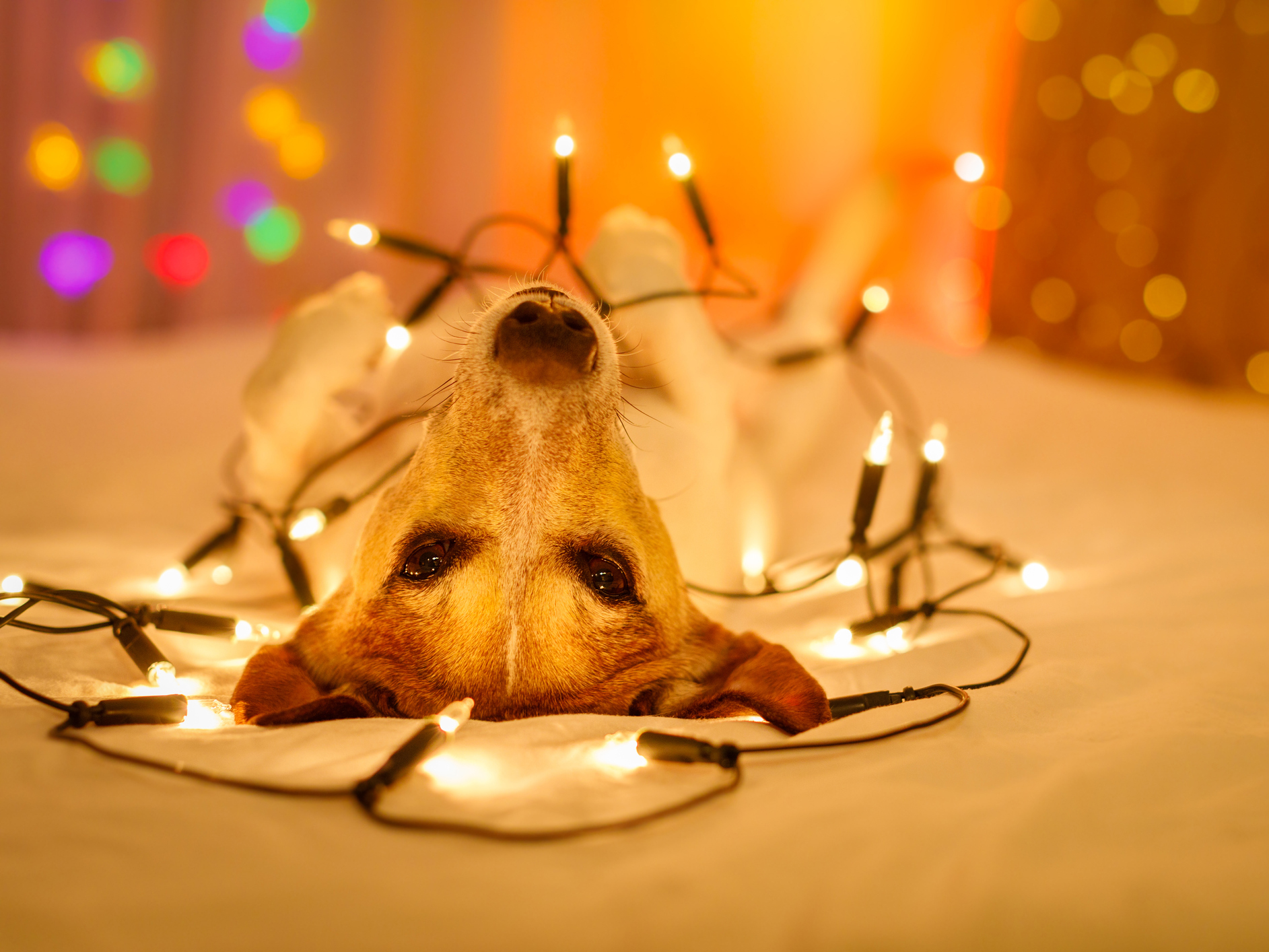

The results are in: having a pet is not only fun and rewarding, but it’s also good for your health.
Despite what most might think, the bacteria that dogs carry can actually make you less likely to get sick. Dogs have been known to detect cancer in their owners, and living with a canine friend can make you happier and less apt to become depressed.
More and more senior living facilities are becoming pet-friendly. They recognize that pets encourage social interaction and physical activity, both of which can benefit heart health.
In return for all they do, it’s only fair that we protect our pets and keep them safe. This can be challenging during the holiday season. With all kinds of dangerous and unusual items around the house, curious pets can get hurt, become sick or even die when they go investigating.
Our pets are part of the family, and they want to celebrate with us. Here are more than a dozen tips for making it a safe holiday season for your furry friends.
Christmas tree dangers
The National Fire Protection Association reports that an average of 170 home fires a year start with a Christmas tree. An artificial tree may not smell as good, but it’s a lot safer.
Here are some tips to “pet-proof” your tree:
Avoid low-hanging ornaments and lights. Pets like to lay underneath your tree and will break ornaments and get tangled in lights. Cat owners who have “climbers” may want to opt for unbreakable ornaments.
If you don’t want to use plastic ornaments, opt for handmade paper ones along with dried fruit on strings.
No candy or nuts on or under the tree. Pets are persistent and will get at the treats. Chocolate and some nuts, including macadamia nuts, are toxic to your pets.
Use twine instead of metal hooks. Metal hooks can hurt pets’ eyes and mouths, and cause bleeding if swallowed. Twine is more easily digested, if it comes to that, and gives our tree a more homemade look.
Steer clear of tinsel. Not only are your pets attracted to its sparkle, but it can really harm them. If it gets caught in their intestines, it can cause problems that require expensive surgery.
Make your tree tip-proof. Anchor your tree with some fishing line looped around the trunk and into a bolt in the wall behind it. This can also be done from the top of the tree into a bolt in the ceiling.
Other dangerous decorations
Toxic Christmas plants. Holly, mistletoe, and poinsettias are poisonous for your pets. Keep these plants way out of reach, or consider the artificial version.
Pine needles from your tree aren’t toxic, but they are small and sharp and can injure your pet’s mouth and intestines. Keep your tree well-watered to minimize fallen needles, and sweep them up every day.
Watch those candles! At any time of the year, a lit candle and a pet should never be left alone together! It doesn’t take long at all for a cat to jump on a table and knock over a candle.
Food hazards
Sweets are not sweet for your pet! Chocolate or anything with the artificial sweetener xylitol is extremely dangerous for dogs. Even small amounts can cause low blood sugar, seizures, liver failure or even death.
Safeguard your dinner table leftovers, your garbage, and any other place where sweet treats lurk.
Safeguard your alcohol. If drinks are being passed around, your dog might easily lap up some spilled wine or cocktails. Drinking alcohol can make them weak, sick and even cause them to go into a coma, possibly resulting in death from respiratory failure.
Pet-safe parties
Set the house rules. Make sure your guests know exactly what they should and should not feed your cat or dog. For the most part, table scraps should be off-limits.
Lock up the meds. Some of your guests may carry necessary medications in their purses or coat pockets. Ask your guests to make sure medications are zipped away in a place where an adventurous pet can’t get to them. You might even offer to store coats and purses in a separate room and keep that door closed to keep Fido out.
A room of their own. Many pets may need a place to escape the noise of a holiday gathering. Give them a room of their own complete with food and water (and a litter box for cats).
New Year’s noise. Noisy poppers can potentially damage a pet’s sensitive ears. And remember that pets are also scared of fireworks. In general, as the countdown to New Year’s approaches, it’s best if your pet has a quiet space to retreat from all the noise.
Also bear in mind that confetti can get lodged in a cat’s intestines if ingested, often requiring surgery.
Sources:
- How to Dog-Proof Your Christmas Tree — Pet Central by Chewy
- 8 Tips to Dog-Proof your Christmas Tree (and Tree-Proof your Dog) — The Dog People by Rover.com
- Holiday Safety Tips — ASPCA
- How to Keep Your Pets Safe During the Holidays — The New York Times
